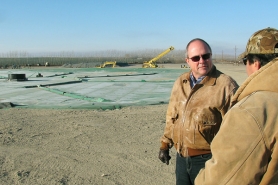
Utility turns cow poop into gas
Feb 11, 2010 - Jennifer Anderson - Pamplin Media Group
 |
Dean Brickey / East Oregonian file photo
Marty Myers, left, general manager at Threemile Canyon Farms, talks with employee Tom Chavez about the operation of the new methane digester, which is expected to reduce the farm’s natural gas use.
|
Customer donations help dairy curb greenhouse emissions
With so much talk about driving less, electric cars and alternative fuels, you’d think transportation was the No. 1 producer of the world’s harmful greenhouse gases.
Guess again.
According to the Food and Agricultural Organization of the United Nations, livestock are responsible for 18 percent of worldwide greenhouse gas emissions, more than total emissions from transportation.
Cows are the primary culprit.
The carbon footprint from producing feed, raising livestock and processing and transporting animal products adds up.Then there’s all the manure – typically dumped into a lagoon on farms – where methane is released into the atmosphere as the waste decomposes.Methane is a far more potent greenhouse gas than carbon dioxide.
That’s why three Portland entities, Bonneville Environmental Foundation, NW Natural and The Climate Trust – a nonprofit that puts together carbon offset projects – are teaming up to tackle the manure problem at the largest dairy farm in the country, located 160 miles east of Portland.
At 93,000 acres, Threemile Canyon Farms in Boardman is home to 41,000 cows that collectively produce more than a million pounds of milk each day.
Most of the milk is sent to Tillamook for processing. But the cow waste – a whopping 120 pounds per cow per day – remains behind.
Since late-November, some of that manure is serving as fuel for a biodigester, producing gas that could power farm equipment and nearby homes.
Biodigesters are an increasingly common way to handle large amounts of animal waste, food waste and waste water, but the new one at Threemile Canyon is unique, says Bill Eddie, director of Bonneville Environmental Foundation.
Designed by J-U-B Engineers Inc. of Boise, the biodigester is mainly comprised of 30,000 recycled car tires fashioned into a honeycomb design.
Organic waste sits on the tires under a flat cover, breaking down anaerobically – where microorganisms do the work in the absence of oxygen – at a temperature of 90 to 100 degrees. Methane gas bubbles up, gets trapped and is sent through a pipeline as biogas.
Just 62 of the 100,000 dairy farms in the United States have biodigesters, according to The Climate Trust. None use the honeycomb design, Eddie says.
After a small-scale trial run in Washington a few years ago, the model was determined to be lower in cost and more efficient than the standard type, he says.
The typical biodigester is a long, narrow, heated and covered tank made of concrete, steel or fiberglass. Organic material is pushed into one side and comes out the other, so bacteria must constantly migrate upstream, Eddie says.
The modular honeycomb design allows bacteria to live on and around the tires, and produce gas in a more efficient and stabilized way. As a result, the Boardman biodigester cost $1.5 million, 25 to 50 percent less than other designs, Eddie says.
Using customer donations
The focus on biodigesters is a conscious effort by NW Natural to help customers conserve energy, says Bill Edmonds, the natural gas utility’s director of environmental policy and sustainability.NW Natural made a five-year investment into the biodigester project, with funds from its Smart Energy program.
Since the green-energy program kicked off in September 2007, about 8,200 customers have signed on. They voluntarily contribute $6 on top of their monthly gas bill, or pay based on usage.
NW Natural sought to put those customer dollars to use in the most efficient, transparent way, Edmonds says.
Biogas focus
Why focus on biodigesters instead of saving the rain forest, planting trees or getting cars off the road?
Edmonds says biogas is more closely aligned with the utility’s business, and is known in the sustainability field to produce clear and measurable results.It also addresses a real problem for farmers, since there’s a limited demand for fertilizer and compost, the main uses for the manure.
“Biodigesters are expensive new technology that farmers honestly can’t afford, left to their own devices,” he says. “Manure management is becoming more and more expensive. Small farmers say it has the potential to take dairy farms out of business.”
Threemile Canyon was chosen because it’s a large farm that allows for some experimentation, Eddie says. One experiment is adding some of the farm’s organic onion waste into the manure to increase gas production. The large herd also provides a lower cost per cow.
If the project proves successful, up to 15 biodigesters could be deployed at the farm.
Besides producing biogas, the Smart Energy program will educate customers about climate change, natural gas and its emissions and how offsets can work to counteract those emissions.
jenniferanderson@portlandtribune.com

|



